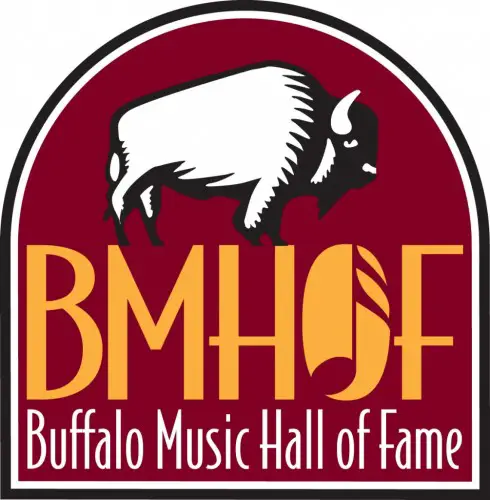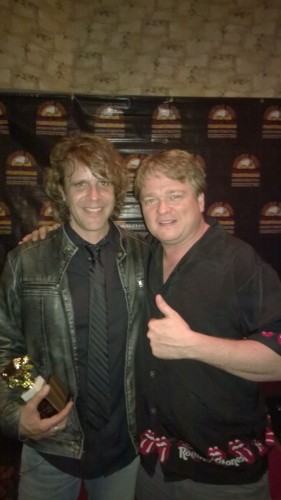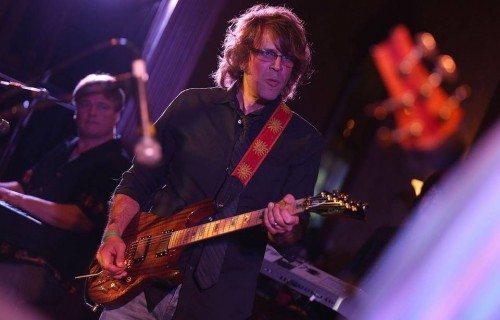 The Buffalo Music Hall of Fame might not read like a who’s who of popular music artists, but like the city’s well-known blue-collar values, the majority of inductees have put in their blood, sweat, and tears into a craft and passion while likely making enough to get to the next gig. The integrity and legacy that the group stands upon is just another reason I am personally proud to be a Buffalonian.
The Buffalo Music Hall of Fame might not read like a who’s who of popular music artists, but like the city’s well-known blue-collar values, the majority of inductees have put in their blood, sweat, and tears into a craft and passion while likely making enough to get to the next gig. The integrity and legacy that the group stands upon is just another reason I am personally proud to be a Buffalonian.
This year, the Buffalo Music Hall of Fame inducted eighteen new members in its 32nd year. The nomination is based on their overall impact, versatility, and longevity in the Western New York music community. Of those inductees includes people who touch music from all angles, but with a common thread of calling Buffalo home at one point or another. The list this year included a wide variety, as it always does, including performers and producers to teachers and the president of VH1. Also in that list is someone whom I personally respect as he is the voice of the city for all of the talent, and lack there of, that plays shows in and around the area. I am talking about Buffalo News Music Critic Jeff Miers who doesn’t just critique, but plays himself and has been involved in the city’s music scene for many years now. I got the chance to speak with Jeff on his induction and his overall view of Buffalo’s resurgence in the realm of music.
Jeremiah Shea: What was it like hearing the news that you were going to be inducted this year?
Jeff Miers: It was a total thrill, to be honest. What incredible company to be in!
I moved to Buffalo during the summer of 1990, after graduating from SUNY Fredonia. I came here to join a Buffalo band that had just started out, called the Tails. I’d met Nelson Starr, who was the singer and principal songwriter with the band, at Fredonia, and we’d become really close, to the point where we’d formed a band to perform around the campus and in town while we were there. At the same time, he and the rest of the guys in the Tails were playing gigs in Buffalo during the summer, when everyone came back from their respective colleges.
I grew up first in Massachusetts, and then later, in the Saratoga/Albany area. There was not much happening there musically, at the time. So after we graduated from Fredonia, the Tails asked me to join. When I came to Buffalo, I was amazed by the level of talent here, and psyched to be in a band that gigged regularly in town, and could build an audience by playing original music.
Buffalo felt like home to me right away, and now, with the Hall of Fame honor, I really feel like Buffalo has embraced me, in the same way I’ve embraced it.
JS: Walk us through your career in a highlight reel sort of way and explain some of the things that you are most proud of contributing to the Buffalo music scene.
JM: I’ll start with the musical side of the equation. I’m really proud of the work we did with the Tails. I loved that band – and we were truly a band, a group of brothers with total belief in our music and commitment to each other. It was wonderful to be a part of the burgeoning independent music scene in the mid 90s, and I feel we helped to pave the way for some of the more progressive, jam-oriented, and indie bands that followed us. We had a great 11-year run.
I joined with the Dollywatchers after the Tails broke up in 2001, and working with that band was rewarding. Terry Sullivan, the singer and frontman, was already a legend on the Buffalo music scene by that point, and I loved performing and writing with him and the rest of the band – Howard Wilson, Kent Weber and Mikel Doktor, all of whom contributed greatly to the Buffalo music community. We played Mohawk Place a lot during that time, and being a part of that whole scene while it was really booming was an honor.
I started writing about music in 1993, in alternative weekly papers, and covered the local music scene from that point forward. When The Buffalo News hired me in 2002, I was firm in my belief that I could really shine a direct spotlight on the talent in the city and surrounding areas. I truly believe that we have something special here, and I’ve done my very best to celebrate that fact in my writing. I always treat local artists the same way I treat national and international artists. It has always been important to me to avoid patronizing local musicians. They are good enough to be judged by the same standards as an artist signed to major label..
Having said all of that, the single thing I’m most proud of is my mentoring of young talent in the area. The next generation of local musicians is pretty much blowing my mind with their talent, the variety of their taste in music, their knowledge of music history and the best present-day music, and their ability to push the music forward. I’m proud to have worked with a lot of these young musicians, because they represent the future, not the past.

JS: Even with a music career full of achievements and a solid understanding of good music, you’re still questioned from time to time on your point of view. Most recently, your Brand New review seemed to ruffle some feathers. What would you say to those who questioned your critique of the band?
JM: The first response, of course, is ‘Let’s agree to disagree; My stating my own opinion and arguing to back up that opinion does not negate your own opinion’.
But beyond that, when things start getting heated, and people can become genuinely nasty and confrontational, I try to remind them that a music critic’s job is not to review how much the crowd was into a particular artist, or how many albums they may have sold, or whatever. It’s about the music. It’s not about how much fun you had with your friends at the show. I’m not there to review a fan’s good time.
And none of it should ever be taken as some sort of personal attack. People are always welcome to “critique the critic,” so to speak. And very many people understand that all of this is about generating thought and discourse about music, which is always a good thing. There will always be those fans who simply can’t tolerate a single negative criticism of their favorite band. I get it. But I have a very clear idea of what my job is.
JS: Growing up in the Buffalo music scene and now being THE music critic in the city, who would be in your list of unsung heroes the city has produced that just don’t get the same exposure as the Goo Goo Dolls and Rick James?
JM: Right away, you have to say moe.! I’m always amazed that this band isn’t mentioned in the same breath as some of the more mainstream acts who’ve done well coming out of Buffalo. The story of moe. is a story of true independent spirit and the spreading of grass-roots support through constant touring and hard work. They were the first big jam band to come out of Buffalo, and you can so clearly see their influence on the current generation of Buffalo jam bands who are making a name for themselves – Aqueous, Funktional Flow, Universe Shark, and others.
Other folks who don’t get mentioned as often – Ani DiFranco, who isn’t exactly under the radar, but still, is clearly an excellent representative of the Buffalo music scene’s true independent spirit. And then there are so many bands that never got “huge,” but could’ve – Girlpope, the Bloody Hollies, Irving Klaws, Lazlo Hollyfeld, and tons more.
JS: With your son already deeply entrenched in music, what kind of advice are you giving him in regards to a career in music?
JM: It was important to me that he understand the difference between “a life in music” and “making it big in music.”
A life in music is unfailingly rewarding. That means you go to music as a sort of sacred place. Music has such immense power to change people for the better. It should never be confused with the idea of “playing music for money or straight-up ego gratification.” It can’t be about that, or it will show.
Of course, musicians need to make a living, and it has become increasingly difficult to do so. But I still believe that there is a way to do that without sacrificing your integrity by playing music you don’t believe in.
I’ve urged Declan to listen to as much music as possible, to study it and feel it deeply, to practice a lot, to keep an open mind, to play often and with musicians who are better than him whenever possible, and to learn as much as he can about how and why music works.
Most importantly, I’ve urged him to find the joy in his own music-making, because that’s what it’s all about.
JS: What’s your view on the current Buffalo music scene, especially compared to where it has been historically?
JM: I hate to sound like a cheerleader, but in this case, I can’t help it. I’ve been here for 25 years, and I have never seen the music scene healthier. There are great artists in so many genres – jazz, indie rock, fusion, prog rock, hip-hop, jam bands, Americana and roots music, neo-soul – you name it. I can find great artists to see for pure enjoyment or for reviewing purposes pretty much 7 nights a week. Buffalo is a music Mecca.



Comments are closed.